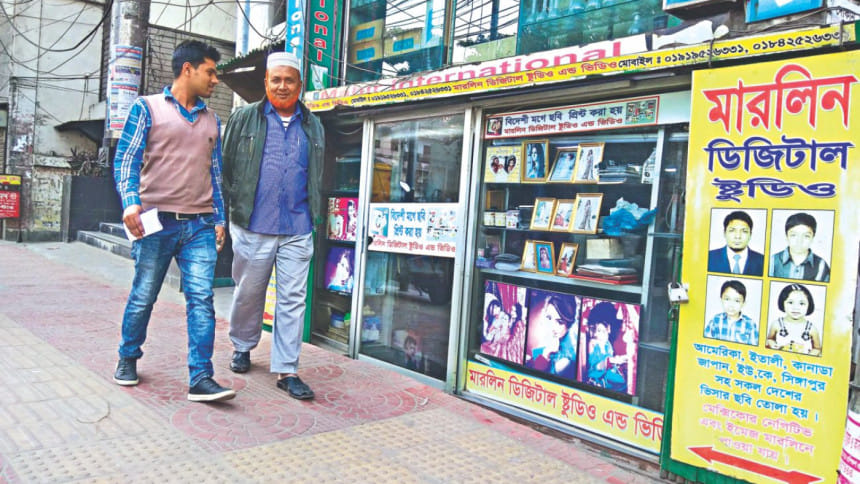Photo studios going extinct

Moinuddin Moin, proprietor of Marlin Digital Studio on the Hatkhola Road, once known as the studio street of Dhaka city, logged in just Tk 930 in sales in three days to January 22.
“The situation could not be any worse -- the smartphone has killed us,” said the sexagenarian, who has been in the profession since his adolescence.
Marlin Digital Studio is one of just the two studios that can now be found on the Hatkhola Road, which was peppered with dozens of small and large studios even a decade ago.
“They have all shuttered,” said Moin, who runs the studio in his own space and thus has been able to avoid the same fate as his peers.
The fast spread of smartphones with decent camera, technology and social media over the past decade mean there is little enthusiasm left nowadays for a trip to the studio with one’s loved ones to get portraits taken for posterity.
“I just stay waiting like the person who fish by hook,” said Moin, who could log in only Tk 50 since he opened the studio at 9:00am on January 22.
Nowadays, only those who need photos for official purposes come, but their numbers are not too high for the business to thrive.
The dried-up demand for studios is a brutal example of the gale of creative destruction described by Austrian-American economist Joseph Schumpeter back in the 1950s.
As economies evolve, technologies that served it well before becomes obsolete as new and better ones come up.
Today, taking innumerable photos on one’s smartphone or digital camera, be it in social gatherings like weddings and birthdays or in one’s daily life, has become the norm.
Deepak Devnath, who signed up for photography when he was a higher secondary grade student, has been able to weather the storm of technological innovation.
He used to work with some corporate clients when he ran a studio at Tikatuli of Dhaka city between 2003 and 2016. He nurtured the relationship and overtime the corporate clients turned out to be one of his biggest support.
“A number of my colleagues have switched to other profession amid continuous losses. Some have switched to hotel business, some returned to their villages from Dhaka. I might have to switch unless I hold on to my clients.”
Devnath, who entered this line of work during the golden days of photo studio business, however, is looking at the glass half-full.
The advancement of technology has hit the studio business but the scope for photography has widened.
The opportunity for event-based photography has risen. Outdoor events, both social and corporate gatherings, have increased. Educated youths are considering photography as a profession.
“So, it appears that the photography profession is likely to survive.”
But the studio business is unlikely to sustain as there will be time in future when one will be able to take photos on one’s mobile and email them over to labs for printing, Devnath added.
The market for photography has expanded, said a faculty member of the photography school Pathshala South Asian Media Institute seeking to remain unnamed.
“Wedding is a big market now, while the corporate sector is creating demand.”
Another two areas are the advertisement industry and non-governmental organisations and human rights bodies, he added.
Yet, for Moin and his fellows in the trade, there is no silver lining. “We do not get these jobs. These are done by event management firms and university students,” he added.
The demand for camera has also increased because of the growing interest in photography among youths, said Md Sanaur Rahman Patwary, president of the Bangladesh Photographic Association.
Yet, the volume of printing is less than the number of photos taken nowadays, he said.
“Today, whatever the number of photos are printed are mostly taken by the customers themselves. Gone are the days of visiting a studio to get portraits taken. The studio sector is now a sick industry,” he added.
To help the studios to remain afloat, the National Board of Revenue waived the value-added tax on photos from fiscal 2015-16. The fee for trade licences for studios has also been slashed.
Moin’s son Ashraf Uddin, an 18-year old higher secondary grade student, also thinks that the studios are going to be extinct in the coming days.
“Currently the studio does not bring us that much income even though we do not have to pay rent. But we let our father continue to do the job so that he can feel that he is working. The closure of the studio will make him feel jobless, alone,” said Uddin while sitting at the studio on a January evening.
For Moin, there is no other profession that he can switch to at this stage of his life. “I have been doing this since my adolescence. What will I do after closing the studio?”

 For all latest news, follow The Daily Star's Google News channel.
For all latest news, follow The Daily Star's Google News channel. 



Comments